#think botw zelda but evil if you will
Text
Whumptober day 25 — “You better start talking”
Sharp swerve from yesterday, we’re back to the pain everybody :)
sorry twi
Warnings: injury, little blood, torture sort of? some sort of nonconsensual touching (nothing inappropriate)
Ao3 link
————————————————————
Twilight awoke in a cell.
Which he probably should have been more concerned about, but this specific situation had happened to him enough that after the initial second or two of panic, he merely sighed, and began twiddling with the ropes tying him to the chair he was seated in.
At least he wasn’t a wolf.
He strained his wrists, trying to break the ropes with sheer force, but the ropes were thick, and knotted rather tight. He couldn’t shift his wrists barely at all, and they already felt a bit raw. Whoever had tied him up had done a good job of it.
Maybe he could move the chair? It was a heavy one, uncomfortable thick wood that he had a feeling would be difficult to drag with his hands and ankles tied, but he had to try something.
He’d just started to pull at it when the door handle rattled.
Twilight froze, and settled back down as if he hadn’t just been planning his imminent escape. The door creaked open, and a woman strode in, a large bodyguard-looking man staying in the doorway.
“Oh good, you’re awake. Now we can get started!” she smiled, and the look of it sent nothing but dread up Twilight’s spine. Smiles like that never boded well for anything.
The woman strode up to him, her dark robes swishing, and stared at him, raking her eyes across him in a way that had Twilight bristling. Her gaze paused on his forehead, and she hummed, tapping a finger to her chin.
“I’m going to ask you a couple of questions, and you’re going to answer them, alright?” she said with a smile. “As long as you answer truthfully, no harm will come to you.”
Twilight barely held in a sigh and inwardly braced himself. There was no way he was getting out of this without at least a couple bruises.
The woman strode up even closer to him then, and took his chin in her hand, giving him an intent look. She brushed a thumb over the marks near his eyes, and Twilight couldn’t help his sharp flinch.
“These marks on your face,” she said curiously, tilting his head to the side, “they’re from dark magic.”
“It’s not dark magic,” Twilight growled.
The woman smiled, pulling him closer. “He does speak! Well then, care to let me in on the secret of what kind of magic it is then?”
Twilight went silent once again.
The woman tittered out a laugh and gripped his chin a bit more tightly, forcing him to look her in the eyes.
“Perhaps you don’t realize who I am. I’m a... scientist of sorts. A collector, if you will, of unusual magic,” she said lightly, but there was a dark edge to her voice. “I run experiments on magic used by those such as yourself, and I’m in need of information on this.”
And she held up Twilight’s shadow crystal, dangling it in front of his face.
Twilight’s eyes widened, then narrowed, and he watched in silence as she ran a slow finger along the crystal, the curse seemingly ineffective against her.
Who was this woman?
“Now then. You better start talking,” she smiled, and the expression she made was somehow more terrifying then most of the monsters Twilight had fought for most of his career. But he kept his mouth shut, turning his head away and refusing to meet her eyes.
Her hand suddenly settled on his shoulder, his pelt and outer layers gone, so he could feel her nails press into his skin a bit when she tightened her grip.
“I asked you a question.”
Twilight closed his eyes and kept his mouth firmly shut.
A hand hit him square on the cheek, making him reel as his head was snapped to the side. He blinked open his eyes in surprise, and the woman stood in front of him with her face narrowed and cold.
“Tell me what sort of magic this is. It’s fascinating; dark magic yet not, a curse worn as a necklace as though it were a tool, you’re covered in its essence. I’ve never seen anything quite like it.”
She grabbed his chin again, staring at his face with eager eyes. “Or you.”
“I’m spoken for,” he said shortly, and the woman raised an eyebrow at the fact that he’d spoken again.
“Is that so? Well then you have quite a bit to lose if you don’t tell me what sort of magic it is you possess,” she said in a low voice, and Twilight closed his mouth again.
The woman’s eye twitched, and she motioned the man in the doorway forward.
“Tell me what you know,” she asked yet again, “or you’ll regret it.”
Twilight almost snorted. You’ll regret it? Oh brother, somebody needed to teach this woman some better threats—
Pain slammed into his stomach and he let out a surprised cough, the bodyguard’s fist having socked him right in the gut. He’d knocked the breath right out of him, and Twilight wheezed, trying to suck in some air.
The woman grabbed his chin again and pulled his face up to hers, staring at him coldly.
Her fingernails were biting into his skin, and he let out a quiet hiss of pain as she tightened her grip, feeling blood bead on his chin. She abruptly raked her fingernails across his jaw, and Twilight flinched.
“Tell me what you know,” she snapped, blood on her nails.
Twilight ignored the stinging on his jaw and the fact that breathing was still a bit tricky, and glared at her, refusing to say a word.
She let out an annoyed growl and motioned her bodyguard forwards again, who slammed the chair Twilight was on backwards onto the floor. He winced as it jarred him, then grunted as the man kicked him in ribs.
Due to the ropes he couldn’t even curl around and protect his head or any other of his more vulnerable parts, only lie there and try not to cry out as more and more hits landed all over him. By the time the man finally stopped, every bit of Twilight was sore and tender, and he winced as the woman kneeled down next to him and grabbed his face yet again.
“Still won’t talk?” she asked mildly, and Twilight bared his teeth at her.
She huffed and pulled something out from under her robes, a long, slender rod of sorts, with swirling crimson designs on the tip.
“This is a magic rod of my own creation,” she hummed, turning it so Twilight could see better. “I haven’t had the opportunity to test it out yet. It’s use is fairly simple: it takes any pain the recipient is suffering from and multiplies it by about... mm, ten I’d say.”
She rested the cold metal under Twilight’s chin, and he froze, unable to keep himself from nervously swallowing.
“One last time. Tell me about your magic.”
Twilight breathed in a steadying breath.
He couldn’t tell her what the shadow crystal was, what sort of magic it was made of. Who knew what she would do with it if she knew exactly how powerful it was? He had to protect Hyrule from this insane witch, and he was willing to do whatever it took to do so.
“Never,” Twilight spat.
And his entire body suddenly lit up with pain.
The stinging scratches on his chin turned into pure agony, clawing gashes of white-hot fire. The countless painful bruises on his person were multiplied, nearly every inch of him radiating pain, and one particularly bad spot where he had wondered if the bodyguard might have cracked a rib turned to an agony so intense Twilight nearly blacked out as he screamed.
It couldn’t have been more than a few seconds before it stopped, but it felt like ages before the metal was removed from his chin and the pain died back down.
Twilight went limp, breathing in short gasps as he tried to get ahold of himself, and shuddered when a hand caressed his cheek.
“Impressive. Most men would be nothing more than a sobbing mess by now,” the woman hummed, then idly traced the marks on his forehead. “We’re done here. If you aren’t willing to talk, perhaps one of your friends are.“
Twilight felt his blood freeze.
He’d thought he was the only one here. How many of the other heroes did she have? Was she doing the same to them? Trying to figure out their various magical abilities and artifacts? He could only hope she didn’t have them all, and pray she hadn’t gotten ahold of their more magical members like Time, or spirits forbid Hyrule—
“Don’t you dare lay a hand on them,” he gasped out, and the woman smiled.
“I won’t. So long as you answer my questions.”
“No,” Twilight spat, and ignoring how much everything hurt, pulled at his bonds again.
He had to protect the kingdom from this insane witch, but he also couldn’t allow her to hurt any of the others. He refused.
“They don’t know anything, you won’t get any information out of them,” he panted, breathing still a bit difficult. “It’s pointless to ask them about it.”
The woman continued to smile, and stood up, dropping his chin.
“Well then,” she said, voice gaining a thrum of excitement. “If you won’t tell me what your magic does, and nobody else knows, I’ll just have to find out for myself. Your friends will be helpful I’m sure.”
“No,” Twilight gasped out again, weakly struggling. Pure protective rage for the others swept through him, and he gained back a tiny measure of strength, thrashing in his bonds. The woman merely watched him, looking almost amused at his weak attempts.
Her smile grew as she left the room, sending a shudder up his spine.
“They’ll make excellent test subjects.”
#linkeduniverse#linked universe#lu twilight#lu fic#whumptober2022#day 25#you better start talking#writing from the floor#random made up creepy lady for plot convenience#think botw zelda but evil if you will#anyways I’m off to eat chocolate#my reward for finishing this up :)#come back in a few days for a continuation#the beloved ‘wild let out a njxxbmx’
95 notes
·
View notes
Text
watching a video about unanswered questions in totk and it's like. well i can answer these! it's because nintendo doesnt care about the story and overarching preexisting lore that much
#neon has thoughts#'what are the zonai' nintendo don't care#'what even is ganondorf's motivation' he's the main series villain of course he's there doing evil. what did you think would happen#i love zelda but its not THAT well written. not since they went with gameplay over story post-skyward sword#'but why do botw and totk reference other games if theyre so far away / in the wrong timeline' because nintendo puts that in there so all of#the theorists and easily pleased people (me) can point and go that's a zelda reference in my zelda#its not that deep. love theorising as much as the next person but It's Not That Deep
100 notes
·
View notes
Text
Will I ever expect Nintendo writing a Ganondorf who's trying to break the curse and end the cycle? No. I simply think their faithful adherence to the nature of fairytales about the knight rising up to face evil and save the princess is simply that strong. It's a classic (in the most literal sense cite Perseus and Andromeda). It's why I don't believe in a playable Zelda until I see it with my own eyes.
While the earnest nature of providing interesting spins on this millennia old formula is rather endearing, I would welcome earnest breaks in turn as well. Yet until I see it, I simply won't be holding my breath for when it comes.
#no slight to anyone wanting either thing in totk but 35 years of narrative precedence is pretty strong#that being said if you ask me my ''dream Zelda game'' much of the plot involves something regarding either one#i think a zelda game where the king of hyrule is zelda's elder brother. a game where link and zelda have long since been married#and the main villain isnt ganon but say an invader of another kind.#but ganondorf is present. a young traveling mercenary informed of his fate to become the king of evil and trying for a cure from that fate#zelda is not taken but an active participant; frequently joining link traveling around hyrule or breaking off to buy more equipment#and do some scouting of her own#it has botws exploration but maybe some linearized pieces of development like a dungeon thats a fortress wall blocking off parts of the map#random encounters against Ganondorf who's time is running out and desperately trying to find zelda#until the two of you are travelling and he ambushes you.#you can lose and must rescue her from his lair. you can fend him off. or you can defeat him and track him down#the first has minimal changes to the ending of the game. the second has a surprise ganon fight. and the third reveals a quest#one where he explains his plight and help break his curse#and in the end the three of you face the villain side by side#i think that would be a cool game#zelda#legend of zelda#tears of the kingdom#totk#loz
142 notes
·
View notes
Text
“The way all of the other races follow the Hylians/the Hyrule royal family unquestioningly makes these games monarchist/imperialist propaganda.”
The other races don’t do that, though?
In BotW the older Zora were straight up like “we hate Hylians!” at first because they resented Hyrule for failing to prevent the Calamity and therefore Mipha’s death. Races that are generally loyal to Hyrule can clearly lose that loyalty given a motivation to do so. In TotK King Zora lost his trust in Zelda and by extension Link when he thought she attacked him.
The Yiga exist because there was at least one Hyrule king who was a bad dude. He persecuted the Shiekah to keep them from being a possible threat to his power, and the repercussions of that betrayal still exist to the modern day. The Yiga sure as heck don’t blindly follow Zelda.
Many people follow the Hyrule family yes but unquestioningly? Blindly? It really doesn’t seem like that’s the case.
#tears of the kingdom#the legend of zelda#loz#totk#legend of zelda#zelda#ganondorf#rauru#totk rauru#totk zelda#totk ganondorf#botw#breath of the wild#would kind of dig a LoZ with an evil king of Hyrule who you need to depose actually…#i don’t think that King is Rauru but it could be cool in a future game#what if the next Princess Zelda is literally like My dad sucks let’s establish democracy
72 notes
·
View notes
Text
everyone complaining about zelda being helpless or ganon being boring or other equally valid critiques of a decades old franchise and im sitting in the corner like :( no bird…
#i also think its silly theyre keeping with the same exact formula#especially when botw was meant to be like. zelda 2.0#like it was meant to push the boundaries of what a zelda game can be and update/rebrand the series#but theyre still sticking with the same basic story as the first zelda: you save the princess#i dont really care because im not. attached to this iteration of zelda lol#i was excited about the idea of being won over by her in this game tho but it looks like she’ll be on the sidelines again#botw characters in general i didnt get super attached to you see so little of them#im willing to sacrifice zelda if it means the elaborate on other characters + add new fleshed out characters#i am sad ganons so basic again. if theyre gonna go just pure evil dude they shouldve kept him a monster#i was more down with him being a pure force of evil when he was literally. just a force of evil and not a whole person like that was neat#whatever. maybe we’ll be surprised again maybe itll be interesting#totk#totk spoilers
20 notes
·
View notes
Text
I'm glad to see more and more ppl willing to admit that totk's story kinda sucks
#Like botw's story was basic but it WORKED with the open ended gameplay and how you have to piece it together#Totk tries to do the same with a more complex story and it doesn't work#The moving parts don't mesh together and it keeps tripping over itself#like WHY IS LINK JUST LETTING PPL RUN AROUND THINKING ZELDA'S TURNED EVIL EVEN IF HE ALREADY KNOWS SHE'S A DRAGON??#and even on its own merits it's just not that great of a story?#They hyped it up like this would be the best Zelda story ever and I struggle to think of one I'd say is worse
5 notes
·
View notes
Text
AAAAAAAAAAAGHGAHGAGHAGHGHRHRGRHG NINTENDO
#twitter won't let me tweet anything so I'm talking about it here#AAAAAAAAAAA SIDE ORDER#MARINA AND PEARL ARE BACK#EVIL PEARL???? it looked like she might've been wearing the hypno goggles in one of the quick shots#AND THE DEAD CORAL LOOKS SO COOL#ngl I wasn't even planning on playing the splatfest this weekend but I sure as shit am gonna now#AND TEARS OF THE KINGDOM AAAAAAAAAAAAAAAAAAAAAAAAAAAAAAAAAAAAAAAAAAAAAAAAAAAAA#it looked like they're adding redeads again!!!!!! I fucking love redeads!!!!!!#one of my biggest/only complaints abt botw was the lack of enemy diversity but they're adding so many more guys!!!!!!!!!!!!!!!!!#and all the new tech and stuff??????? it looks so fucking cool something abt it makes it feel like more of a classic zelda game in a way id#idk*#like it makes me think abt the twilight princess beyblade I'm so fucking excited#AND GANONDORF#PLEASE PLEASE PLEASE HUMANIZE GANONDORF#URBOSA ACKNOWLEDGED HIS HUMANITY IN HER DIARY PLEASE PLEASE PLEASE PLEASE EXPLORE HIS CHARACTER I'M BEGGING YOU#ITS ALL I WANT#rambles
1 note
·
View note
Text
a lot of people have already pointed out how totk has a lot of themes of imperialism and generally leans conservative ideologically, but what i think is interesting is how totk subtly redefines what a “researcher” is.
zelda wants to be a researcher in botw, and what this means in the context of botw is largely someone who works with sheikah technology. she wants to figure out ancient sheikah tech, she has an interest in botany and otherwise nature and biology (the whole silent princess and the frog thing), robbie and purah, the two characters who are the closest to us seeing what a researcher in the context of botw is are basically inventors. in totk, however, the main researchers who are presented to us are all historians.
this is an interesting pivot, because in botw zelda is not really interested in history. if anything, the one who’s deeply concerned with history is rhoam, wanting to preserve historical tradition and his uncritical reliance on said tradition and historical precedent is what leads them to their doom. in botw, zelda is narratively opposed to history, if anything, all the ancient tech backfires on them and traditions fail to awaken zelda’s power. zelda’s urge to be a researcher is in wanting to understand the world around her, not just blindly follow ancient plans but rather have agency within them.
totk, however, is obsessed with ancient plans. the only real moment where zelda gets to geek out in totk is her getting all giddy about finding out more about the divine origins of hyrule. all the researchers in the game are concerned with finding out more about the zonai. since all the mentions of ancient sheikah technology are scrubbed from the game purah and robbie read more as strange outliers, the sheikah slate is no longer, now it’s the purah pad, a product of purah rather than something larger. the whole game is literally about following an ancient plan, a plan most characters don’t fully understand as they sign up for it. totk’s main story is built on confusion, on the characters not knowing what’s fully going on but having faith in ancient sages telling them what to do. in botw, following ancient plans you don’t fully understand was the thing that doomed you. in totk, following ancient plans you don’t fully understand is the gimmick.
that juxtaposition between the two games has an ideological through line: botw posits that progress is necessary. mindlessly relying on tradition doesn’t work. prophecies are omens, not instructions. history must be learnt from, not repeated. the ancient sheikah aren’t a group to be emulated, but rather to be learnt from, considering their machinery backfired and the royal family betrayed them. totk, however, is obsessed with the mythical history of hyrule, a time where everything was idyllic until one bad man showed up, a time we must emulate in order to win. i already talked about how the past in totk is zelda’s life pre calamity but better here, but that also plays into the idolisation of that era and its royalty. in botw, even the myth of the first calamity preserves the fact that the yiga clan has origins in the royal’s family persecution of the sheikah, even the time when they successfully held back the calamity is tinged with mistakes that still affect the world ten thousand years later. in totk, ganondorf’s origins are nebulous. nobody provoked him, nobody did anything wrong, he’s just evil because he is.
a lot of right wing ideologies are hinged on preservation, but more than that: the belief in the nebulous mythical past in which everything was better. “make america great again”, the fascist’s idolisation of ancient rome which is represented largely inaccurately, look at any conservative rhetoric and you’ll see people complaining about how things nowadays are ruined or are being ruined, how in the past things were this way and they’re not anymore, which is bad. the belief in the fact that in some past period we were great and are not anymore, and the strive to emulate that past is a trait highly typical of right wing ideologies. and in totk the past as a great era is an idea presented completely uncritically, the narrative is entirely controlled by the game and doesn’t dwell on any of the inconsistencies in this idea.
now, obviously, not every story in which a great ancient era exists is fascist, right wing or conservative. but to me what’s interesting specifically in totk is this shift between the two games: botw is critical of the past. it’s critical of arrogantly repeating history, it’s critical of having blind faith in great relics of the past. totk isn’t. totk idolizes the past, totk tells legends and tells you to believe them without any doubts. botw believes researchers are those who seek to understand the world, innovate it and solve problems without relying on ancient ways. totk believes researchers are those who discover ancient instructions, ancient ways and relay them to great men in the present to be followed. the four mainline regional quests in botw are about discovering four ancient relics that are terrorising the land and fixing the mistakes of the past. the four mainline regional quests in totk are about discovering four ancient legends are true, and receiving instructions from an ancient sage on what to do.
totk is not simply neutral, it is ideologically conservative in stark contrast to botw, because of the things it chooses to leave uncriticised, notably the things botw was very poignant about examining critically. the way totk redefines what is a researcher is indicative of this, indicative of the way it chooses to idolize or present as an unexamined good that which was nuanced in botw. totk isn’t just conservative in the sense that it presents uncritically a “good king” and “evil conquerer”, it goes deeper, it’s notable because botw was starkly opposed to the thematic axioms totk presents.
i just think it’s very interesting that they made a sequel to botw, and completely redefined or otherwise ignored botw’s thematic core.
#totk critical#loz#botw#totk#legend of zelda#tears of the kingdom#breath of the wild#meta#analysis#my hot takes
2K notes
·
View notes
Text
THE GERUDO POST
(aka an attempt at a critique of how gerudos were handled in BotW and before)
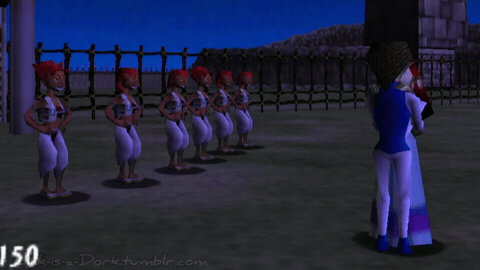
Oh no. TOTK being right around the corner, it might finally be time for the Gerudo Post.
(aka half of the reason why I made a Zelda sideblog in the first place)
So I want to preface all of this by saying that, as you could probably tell already, I’ve always adored the gerudos. They have fascinated my small child brain when I was 7; then the obsession made its comeback when I was 14, and now, here we are, almost 28, and I’m still thinking about the gerudos. I think they might be among my favorite fictional cultures for their potential and their understated storyline. I guess growing up in a very Arabic neighborhood, coupled with being bi-culturally latinx (?? does Brazil count?? you tell me), also always made them feel like home to me –especially when I was very young and there was not a lot of cool female representation flying around that managed to involve fiercely independent PoC women, flaws and teeth included.
This whole weird-essay-thing tries to do two things. First: analyze the place gerudos have occupied in the series, their initial problematisms and their subtextual narrative arc during the Myth Era coupled with their relationship to Ganondorf. Second: tiptoe to Breath of the Wild and poke it with a stick to see what happens –and in doing that, explain why I believe a lot of their characterization was defanged in service of smoothing their past with the hylians instead of deepening the culture on its own terms, and why I’m a little apprehensive about what that might mean for TotK even though I adore seeing the best girls at it again.
Those are the uhh terms of service??
And now, we must go back to 1998.
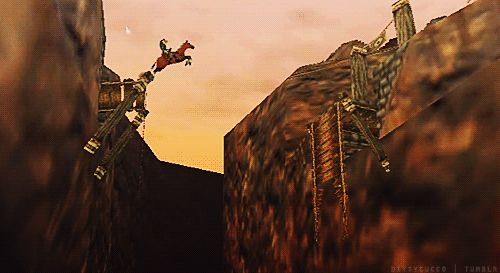
OCARINA OF TIME ERA
There’s so many things about the gerudos that are noteworthy and rich, and they’ve made for a complex piece of Zelda lore ever since their introduction –and when I say complex, I don’t 100% mean it as praise. The very racially charged decisions made about their inclusion have been discussed at length by the fandom, especially when it comes to orientalist and Islamophobic tropes being deployed pretty thoughtlessly in Ocarina of Time (their sigil being literally a crescent moon and star originally, the parallels are pretty obviously there).
We’re talking about a band of amazon-like, big-nosed brown women from the desert ruled by a single Scary Evil Man born once every hundred years hellbent on conquering Hyrule who they apparently worship like a god, characterized primarily as thieves, decked in jewelry and orientalist-inspired harem/belly-dancing clothing, hostile to the white good guys of Hyrule (especially men), unblessed by the Goddesses and so deprived of elongated ears (this is true for OoT –we’ll come back to that), also known as a demon tribe with their deity straight-out described as evil-looking by Navi (on my way to cancel you on twitter Navi you watch out), and secretly led by evil twin witches who can turn into a single seductress and, as two mothers, raised their Scary Evil Guy king who happens to basically be the devil.
In so few words, gerudos are the future that liberals want.

It’s worth notice, also, that Ganondorf’s characterization in this game is… kind of relentlessly uncomfortable to play through, especially before the 7 year skip. The utter assumption of depraved and evil intents from every character surrounded by dialogue that does little to hide its biases in spite of having generally very little proof to back them up –even though, in the game’s context, every character is correct to call his eyes evil and the darkness of his skin a moral judgment in on itself. The scene where Zelda demands that we believe her conclusion that the sole and only brown guy in the entire kingdom is evil and will do harm, and the game straight out refuses to progress until we concede that her dreams are prophetic and that this man must be stopped at any cost even though she has no more proof than her discomfort… hits different on replay.
I’m restating all of this not to pretend I’m making a novel and thought-provoking point, but to bounce back on a tumblr post I saw a while back (that I can’t find anymore!! I’ll link it if I find it again) –and so express what it is that gripped me with the gerudos in spite of their pretty damning depiction… and actually maybe thanks to it.
There’s a surprising amount of texture to Ocarina of Time’s worldbuilding that exists folded within the things introduced and left hanging, or in its subtext –and whether on purpose or not, I believe it is why people keep coming back to this iteration of Hyrule.
What was that about the king of Hyrule unifying a war-torn country? Why did the gerudos break the bridge connecting them to the rest of the kingdom during the 7 year timeskip while still worshiping Ganondorf, and why are the carpenters trying to rebuild it against their apparent wishes? What was that about gerudos imprisoning hylian men trying to force entry into their lands? What was that about the secret death torture chambers right next to the Royal Family’s tomb and connected to the race of people who were, apparently, born to serve them?
Nothing? Oh okay… okay… okay….
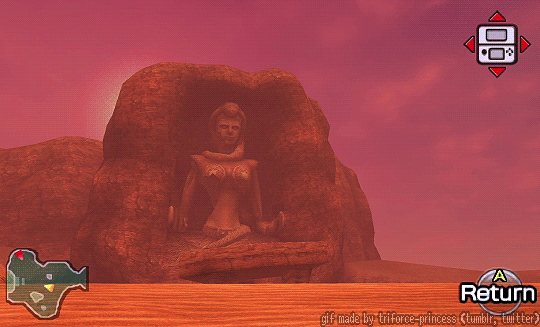
The same can be said about this strange depiction of this hostile tribe, consistently described as wicked yet suddenly friendly once you prove you deserve their respect once you... defeat them, so you now have joined them? Ocarina of Time isn’t very consistent when it comes to characterizing them as their occupation (thieves) or as a proper culture, with a king and a strange system of rulership that seem to involve at least 5 people: Ganondorf, the Twinrova, Nabooru and the unnamed random woman who decides you’re now part of the gerudos because you slashed enough of them with your sword and hookshot, which, uhh ok.
They’re but a ragtag and negligible group when discussed next to gorons and zoras and hylians, but they also clearly have their own religion and at least a 400-hundred years old history (probably far longer than this) and hints of a written language of their own. I’m not sure the game itself knows what it wants them to be, beyond: intimidating and hot and cool, but also wicked and, because of Ganondorf and the way you barge in their forbidden fortress (heh) with the explicit intent to dismantle their king, in apparent need to be saved from themselves.
Speaking of rulership and the Spirit Temple, let’s have a quick tangent about Nabooru: I always found her characterization when meeting with Child Link pretty strange. I refuse to mention the promised reward, which feeds into everything orientalist mentioned above, but I always found her moral compass so extremely convoluted for someone coming from gerudo culture. Nabooru says that, despite being a cool thief herself, she resents Ganondorf for killing people as well as stealing from women and children. Stealing... from women. Nabooru. Why are you this pressed that he steals from women!!! This feels so out of place, that the only girl of that hostile culture that betrays her king and befriends you, is the one that upholds moral values that only a hylian could possibly hold.
Either way: the strange unquestioned contempt of the game for them as a culture, mixed with the occasional bouts of heart, friendliness and badassery, makes it hard not to consider their depiction as pretty biased in favor of the hylians finding them at once exotic, scary and exciting, and could hide a more complex reality you might only get one side of –especially when you know there were originally plans for Ganondorf’s character to be more gray and motivated than what the campy final version ended up being. To be blunt: even in the context of a game for children, and maybe because of that fact, it all reads like a reductionist and imperialist/colonialist reading of a more complex situation.
This might seem like A Lot coming from a game where the actual game writing can be this overall flimsy and simplistic due to the standards of the time (it’s rough, it's so rough). But I would have never dwelt on that thought about a little children’s game if not for the mainline entries that came soon after, because... ooo boy.
The sense you’re not getting the whole story was certainly not helped by the introduction of Wind Waker Ganondorf, and the chilling emptiness of Gerudo Desert in Twilight Princess.
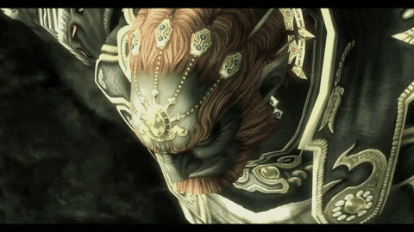
AFTER THE TIMELINE SPLIT
(I’m skipping Majora’s Mask, not because I dislike them in the game or think they’re not worth talking about, but because it’s a parallel universe and they’re never even called gerudos and their reality seems extremely different from their sisters in Hyrule so I think it’s okay to call them tangential and not dive too deep in this particular depiction)
Here’s something I want to highlight about gerudos and how they were characterized before BotW came along: their absence. Not only their physical absence, the lack of any gerudo character that calls themselves gerudo, but their absence from the text itself.
It’s not that Wind Waker and Twilight Princess retroactively scratch them off existence: we can clearly see Nabooru’s stained glass art in WW as well as recognize them being mentioned in Ganondorf’s final boss soliloquy, and WELL there’s quite a lot to say about their imprint over the world of TP. They are there –or at least they... were there. But nobody ever talks about what happened.
In Wind Waker, there was the deluge. It’s assumed lots of people died then, and those who survived scattered across the Great Sea. Are they sealed under the waves? Have they drowned? Is Jolene, Linebeck’s ex-girlfriend in Phantom Hourglass, a distant relative of one of the rare survivors? It’s unclear, beyond the fact that Ganondorf is the only living gerudo we see in this entire branch of the Timeline split.
In Twilight Princess, the desert which bares their name is empty. The hylians never mention that it used to be the name of a tribe: they’re not even named when Ganondorf is introduced for the first time, reduced once again to a mere band of thieves. We learn his plans to steal the Triforce in OoT were foiled, and that he may have turned to war. Then he lost the war, and was executed in Arbiter’s Ground: a strange structure in the desert, a mixture between a temple, a prison and a coliseum. What looks like gerudo writing coexists with hylian symbols, which often look much fresher. This dungeon is the Shadow Temple of TP: a prison hosting the worst criminals the kingdom has ever known, now haunted and cursed. Besides the locations, the only character that vaguely look gerudo in the entire game besides Ganondorf is Telma, a character with pointed ears that never seems to identify as anything but a hylian. What happened? Who’s to say. Nobody ever says anything. Not even Ganondorf bothers to mention them the way he did in WW –and though the game’s story is quite focused on another exiled tribe seeking revenge and dominion over Hyrule as retribution, the parallel is never explicitly drawn. So who’s to say what happened there. Who’s to say.
And in A Link to the Past and the games forward? The only mention of other gerudo characters are Koume and Kotake, resurrecting their son in the Oracles games through their own sacrifice and failing to bring anything back but a monstrosity incapable of making conscious decisions. Granted, most games in that extremely weird Fallen Timeline predate OoT and therefore had yet to make gerudos up at all. Still: canonically, between the gap of OoT and ALLTP, whatever it may be, gerudos disappeared here as well.
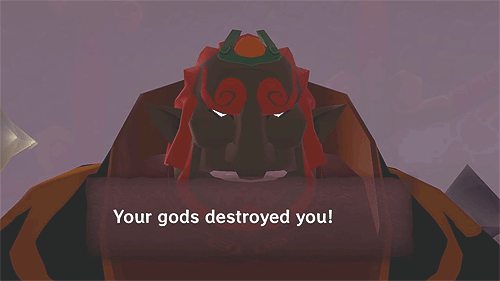
I think there’s something subtle and a little heartbreaking about the fact that no matter what Ganondorf does, the gerudos always end up dying out. His yearning for Hyrule, its gentler wind and the Triforce blessing its lands always costs him the kingdom that he does have already.
Now, does he care? A lot of people would argue that he doesn’t, that he used them like pawns for his own ambition and saw them as servants more-so than sisters, and I wouldn’t be surprised if it was Nintendo’s official opinion, but… One very powerful thing about most of Ganondorf’s incarnations (focusing on the human ones) is that he never seems to reject his cultural heritage. They could have gone for him wearing more kingly hylian stuff given the whole underlying theme of envy and pride surrounding his character, but never once does he try to look more hylian, beyond the ear situation that seems to be tied to the Triforce of Power? Either way: he is gerudo. Several of his outfits reference his mothers, as well as general gerudo patterning and jewelry. His heritage is something he proudly displays, even hundred of years in the future when there is no one left to remember what it means but him. I think it’s a very potent piece of characterization, an arc that crosses over multiple game and says something pretty intense about this character’s fate and his inherent destructiveness over the things he touches –starting with the Triforce, all the way up to his very own body and mind. His mental breakdown by the end of Wind Waker, when the king of Hyrule himself forces him to give up on the thing he sacrificed everything for, takes a new kind of weight with the whole picture taken into account.
(not to excuse genocide or general egomania-fueled madness and violence, but one thing doesn’t mean the other isn’t also relevant)
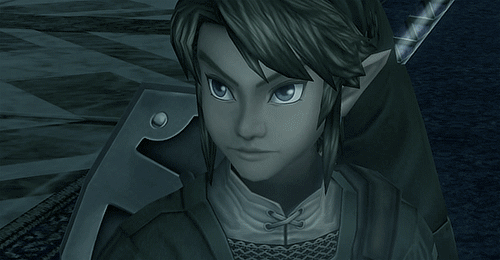
Regardless of whether this is a tragedy for Ganondorf as their uhh complete failure of a king, honestly, it is undeniably a tragedy for the gerudos themselves: a once-in-a-lifetime joyful event turned into a never-ending nightmare from which there seems to be no escape, their legacy now condemned to fade to black, leaving nothing behind but a demon boar forever laying ruin upon the world.
One may say I’m taking on the bleakest explication for the gerudos’ absence when there could be others. It’s true! Perhaps the gerudos are just chilling off-screen, completely fine, not interested in whatever is happening in the kingdom nearby and their disaster child having yet another temper tantrum about not being the Goddesses’ favorite boy. It’s possible! But regardless, what little elements we do possess as players doesn’t seem to support this, even if it remains possible –and regardless of actual gerudo lives, gerudo culture is definitively a goner in every single timeline.
Even if they did survive... Hyrule still won its unification war.
(I won’t mention Skyward Sword as they are not really a thing there, except for a butterfly that seems to suggest the Gerudo Province was a thing before the gerudo people –I don’t know what to do with this honestly– and the whole Groose situation, which, I’m not sure what to make of either beyond the fact that he may have gotten cursed by opposing Demise? And then went on to start the gerudo tribe, which ended up being an all-women group for some reason? Maybe? It’s not confirmed? I feel like it’s more of a fun tidbit than a central piece of the gerudo puzzle, so I’ll leave it there like I would a cool rock I brought back from a walk and that I don’t know where to put in my house)
Then, Breath of the Wild happened and changed things.
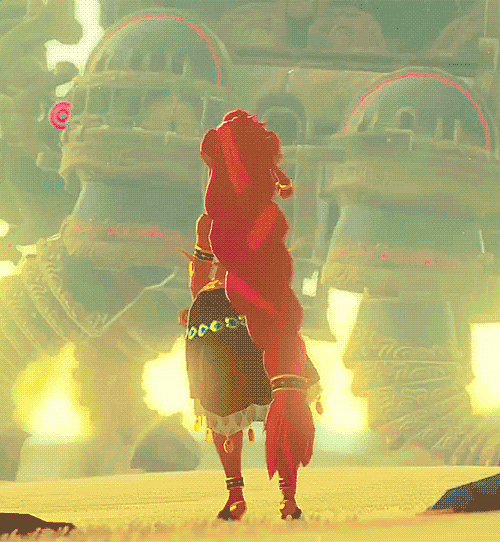
BREATH OF THE WILD
(Additional short note, but: while I won’t mention Four Swords Adventure, since it’s a weird one that almost nobody has played and severely messes with the Timeline, we kind of see the beginnings of what is about to happen in Breath of the Wild in this game –gerudos coming back without much explanation, then distancing themselves from Ganondorf to become friends with hylians because he was too hungry for power and now they are nice and have good reputation because they are our friendsss)
I was actually so happy to learn gerudos were making a comeback in a mainline Zelda game, and this got me more excited about Breath of the Wild than basically anything else the game involved. And getting to explore the Desert once again, meeting this new batch of impossibly tall buff girls, getting more about their language and their culture, Riju and the rest of the little girls are adorable, the grandmas are so cool, the sand seals??? sign me the fuck up??? And above it all, hanging around Gerudo Town at night and feeling as warm and cozy as little me liked to imagine how freeing it would feel, to stay there and watch the desert behind the safety of their walls in OoT… This was great. I loved it.
It was a huge compensation for the criticism I’m about to make, but did leave me with… questions regarding how their culture was going to be handled moving forward.
I’ll start with something small yet deeply revelatory, then work my way from there.
So... gerudos’ ears are pointy now.
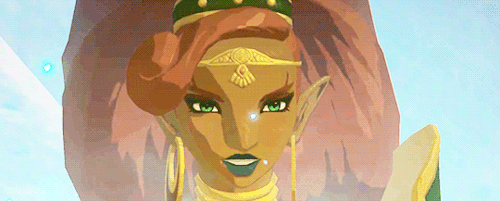
This is pretty significant. Lore-wise, it’s been said that the elongated ears of hylians are there so they can better hear the voices of the gods. It’s considered a sign of holiness in-universe. There's a bunch of really thoughtful analysis on tumblr over that whole Ganondorf ear situation, which is a mess but also very interesting, but the short answer is: I think the absence of pointy ears was a clear design choice to originally signify them as Less Good. Even when Ganondorf gets pointier ears, they never get as long as hylians’. Worth noting: not every non-gerudo character has pointy ears: gorons, zoras and ritos (among others) do not possess this trait, and there are even some humans that have regular rounded ears in the series –though they always seem to be of lesser relevance, if not downright peasants in Twilight Princess. Pointy ears always tended to implied a strict hierarchy in the series: basically, the more pointy, the more Protagonist you become.
(also their eyes becoming green instead of the traditional yellow/golden, which looks more wicked and demonic --and cooler also tbh)
The pointy ears imply two things. From within the game, this could be interpreted in two ways: either that gerudos… converted, for a lack of a better term, and are now considered holy through their worship of the Golden Goddesses and/or Hylia, or that their mingling with hylians through tens of thousands of years had them acquiring this trait out of sheer genetic override (though they have kept their mostly-women birth rates, their big nose, darker skin –for the most part– and red hair). Probably a healthy mixture of both. Design-wise, it signifies something quite simple to the player: they are on hylians’ side now. They are good guys. We can trust them, even if they still have a little spice in them. They aligned themselves with us and against Ganon in all of its manifestations (even if he’s but an angry ghastly pig being parasitic to everything it touches in this iteration). They are on the side of Good, definitively, and will fight evil by our side.
On that note, I think it’s worth bringing out another major change from their initial iteration, which is their overt friendship with Hyrule as a whole, and with the Royal Family in particular. Despite not allowing any voe inside their walls (we’ll come back to this), their relationship with hylians is pretty neat. They have booming trade roads, travel and meet with the rest of the cultures, and are fierce enemies with the Yiga clan, who are renowned for being huge Calamity Ganon supporters. The tables certainly have turned. I want to bring out, in particular, Urbosa’s friendship with the queen and her role as the cool aunt taking care of Zelda and protecting her from evil (to be noted: I am not familiar with Age of Calamity so if I’m mischaracterizing her in any way, please let me know). The gerudo sense of sisterhood has been extended to the royals they used to fight against. I would go on and say the cultures peacefully coexist, but I think that what we’re looking at here is a case of vassal behavior, just like we used to have from zoras (in the non-Fallen Timelines) and gorons. This is a huge departure from gerudos being openly rejecting of Hylian culture in their initial iteration, and something that is worth returning to later.

Okay. Now it’s time to mention the weird obsession BotW gerudos have with romance. I didn’t take notice of my issues with their writing until I realized how prevalent of a theme that was. Now, the reason given for gerudos to refuse entry to males (of every race) has much more to do with preventing young gerudos to make mistakes than anything else, and is actively being put into question by the younger generations –which would make sense. But the amount of NPCs that either lament their lack of match, talk about their husbands (because they marry now apparently) or are invested in romance, and a very limited understanding of romance at that (heterosexual, closed, etc), makes for much more of the population that I initially expected. There’s no mention of what’s going on with their males, if there are new males being born and either exiled or abandoned, or if Ganondorf being technically still alive have have cut them off male heirs. Either way: no more kings, only girlbosses chiefs.
To have the gerudos so interconnected with Hyrule, not only through trade but through extremely coded romance where they have to make themselves palatable to a future male partner and enforce fidelity, was… a choice. The extremely brief and skippable mention of gerudos sometimes going to Castle Town in search for boyfriends in OoT became half of their personality traits in this game. We went from a race that was fiercely independent and mocking of the unworthy men who tried to mingle with them, to… this. Now I’m not saying some of the sidequests aren’t cute, or that I didn’t like the wedding, or that the grandma near the abandoned statue of Hylia (so she was worshipped at some point) clocking us and talking about her love life wasn’t one of my favorite gerudo conversations. I’m saying that the vibes have definitively changed. For the better? I’m not sure.
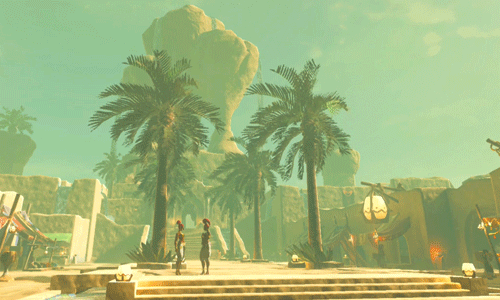
I once stumbled upon an article that said that Breath of the Wild gerudos were a huge improvement compared to their original introduction, because they were no longer presented as evil and hostile thieves groveling at the boot of a single man, but as a full culture allied with the protagonist and actively involved in the story, while still getting their Cool Girl Badass moment (again can’t find it anymore, I’ll link it if I stumble upon it again). I see where this comes from, but I honestly can’t help but consider it a reading that assumes something pretty major (though through no fault of their own, as the games tend to hammer this down as hard as they can), and that being hylians as the unquestioned anchor of Good.
Which, in spite of what the games want me to believe, I… feel uncomfortable taking at face value.
To me, regarding how gerudos are being incorporated in that goodie narrative, this is kind of a case of surface-level feminism trumping over colonialist/imperialist concerns. It becomes more important to perform the aesthetics of being cool and friendly and independent than scratching at any deeper problem that would risk making people uncomfortable. This is kind of Green Skin Ganon all over again: oh wait, isn’t it a little icky to have the evil bad guy being brown while faced by the most aryan-looking ass heroes of all time? Okay, then let’s take the brown guy and make his skin green so we don’t have to feel bad anymore that the conflict has racial undertones!! Solved!! There’s nothing questionable about changing a PoC's features to make it more monstrous and less human, right?
To me, it’s kind of the coward option: instead of accepting the messy reality those initial choices created (and their interesting nuances if taken at face value), let’s just… rewrite the PoC culture’s history to make it feel less uncomfortable for the white heroes. In many ways, it is an extension of what hylians have always done: scrubbing the weird and messy things about the past and shoving them deep down into the spooky well and far into the desert prison and away in alternate hellish dimensions, and then make up a very simple story where they get to feel good about themselves –except this time, it’s the fabric of the games, the literal reality, bending backward to make it happen. Which, in my opinion, makes it much worse than before. Now, there’s no conversation. The fabric of reality is changing their own history so that there is nothing to discuss anymore. Ganondorf was always evil incarnate. He never had any point. It was always 100% his own fault, his own hubris, his own fated wickedness. He was always demonic (and green, very important –having a flashback to people on twitter accusing artists restoring the TotK green skin to the original brown of wanting to make Ganondorf black, and like….. how do I put it gently…..)
And, above all else: gerudo are to distance themselves from his legacy so they can stay in the club of the Good and Just and Holy.
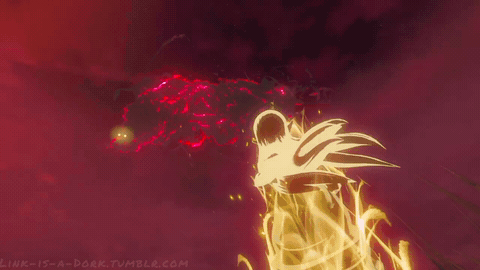
Because here’s the messy thing: as much as I love seeing the gerudos again in Breath of the Wild and as much I love for them to have survived the Era of Myth (??? somehow ???), this… kind of changes Ganondorf’s character arc. No longer do we have the story of a king who wanted more, either for his people, for himself or both, and led his culture to its destruction in his search for absolute Power, while remaining ironically incapable of maintaining what little he already had. This starts from him kneeling to the king of Hyrule in OoT and leads to the deluge, Arbiter’s Ground, his own mothers dying for the sake of his failed resurrection. Breath of the Wild changes this: now, the gerudo were apparently fine without him? They apparently did their own thing and became suddenly and inexplicably disconnected from his actions? I know it’s kind of implied they side with hylians at the end of OoT, but it’s honestly never really explored why they would cheer for the death of their king while never seeming to resent him before except for Nabooru –there are mentions of brainwashing for those who resist him (as well as “other groups in the desert”, tho they are never mentioned again), but it’s hardly a proper plot point for the majority of the tribe, aaaand they still die by Wind Waker in the Adult Timeline, in spite of their potential alliegance…
(again, this shift towards submitting to Hyrule actually started with Four Swords Adventure, getting crisper with each iteration)
There used to be this polite blur regarding Ganondorf’s relationship to them, how much he used them and how much he acted in their name (with arguments for both sides), and I think this messy and debatable question mark was one of the most compelling aspects of his character. Gerudos rejecting their relationship at a near-cosmic, reality-bending level, removes a huge layer of complexity to both parties… all for the benefit of making hylians come out cleaner out of this whole exchange, their moral grayness barely a whisper in the distance.
I’ll kind of go on the record and say that I suspect the addition of Demise to the canon to serve a similar purpose (at least in part): if Ganondorf becomes but the manifestation of a demonic curse, and is no longer an extremely messy character brimming with agency and drive, forcing the heavens to reckon with said agency in a way he was never meant to access, born from a complex set of circumstances from which we clearly get only a limited and biased perspective, then it becomes extremely clear that he’s a Bad in a way that isn’t worth exploring further. Even if he does have some points, he is a Bad. It’s what matters most. Not to say I even hate what this angle can bring to the table or that I want him to become Good (I don’t –I’ll talk more about why I dislike most takes on him being a helpless victim to the curse), but once again, who benefits from adding another Unquestionned Baddie to the equation to rest upon? Not him, and not the gerudos, that’s for sure.
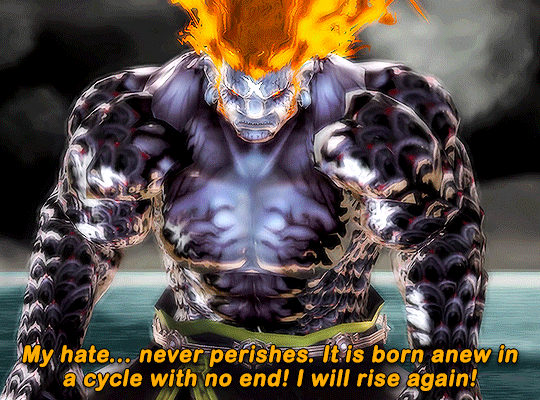
So. Why did I, me, personally, like the gerudos in the first place?
Beyond the inherent coolness factor of their culture and the fascinating mysteries of what is merely suggested, I think… I think I loved gerudos because we were obvious outsiders. Because their rejection of Hylian culture was so sharp and extreme, their value system so different, and their writing, their religion, their relationship to power and hierarchy and worth wanted nothing to do with hylians. They didn’t need hylians, beyond them having potential resources to steal. In fact, the threat of hylians influencing their culture was such that the entry to the Fortress was forbidden to everyone (I don’t think men were ever singled out, by the way, even though they are mocked relentlessly). I think there was something inherently hopeful about this semi-matriarchy resisting the outside world, and especially its notions of what girls were meant to be –it was 1998, and every other girl character in OoT, besides Impa and Sheik that?? is another can of worms entirely, is either helpless or someone to save. For them to reject this narrow vision of femininity was, in my opinion, much more radical than what we got in BotW. Less nuanced, more problematic perhaps? But also much more powerful. Gerudo Valley is home, not to a town, but a Fortress.
Hylians were worth being resisted.
In Breath of the Wild, their refusal to let men enter their town is kind of boiled down to a fading tradition over-focused on romance, a meek little game of chase. Their entire goal seems to be finding a hylian to settle down with. Say what you will about the single man and the many girls (never explored and completely open-ended in its implications, btw), but at least it wasn’t… that. At least it opened the way for different ways for people to exist and imagine culture and civilization, outside of the heterosexual couple, the christian-infused patriarchy and its trickling down implications. What I want to say is: let my girls tell hylians they ain’t shit!! That they aren’t the end all be all of reality! This is what made gerudos so compelling in the first place! Where is that bite now? Where is that self-definition?
It’s gone, because hylians need to be Good. So we tee-hee at the creep running laps around the town, we disguise ourselves to breach their trust and infiltrate their town (though there is nuance to be had there, gender be complicated etc), we watch them pine after shitty dudes and take classes to become the perfect approachable woman and make love soups with ?? strange ingredients honestly, and we witness them get very friendly with the Royal Family they used to conspire against, dying to protect the princess against the manifestation of their ancient king reduced to a raving puddle of Bad Boar.
Hyrule, unified against him.
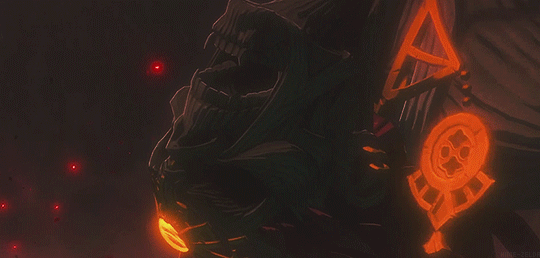
TEARS OF THE KINGDOM
For posterity’s sake: this post was made before the game was released. I’ll probably update my thoughts on a separate thing later on.
I don’t think gerudos allying with the hylians and burying their own legends about Ganondorf as deeply underground as they can until it blows up in their face is a bad setup at all. It’s actually pretty juicy, and there’s a ton of fascinating stuff that could happen here –even some involving gerudos taking a firm stand against him while still reconnecting with their past and the choices they made once. This is my hope with the title of the game: Tears of the Kingdoms. Let’s examine them all, account for the damage, and decide how we move forward from there with the full knowledge of where we come from.
What I am afraid of (and I already made posts about that) is the scenario where gerudos rallying against Ganondorf, which I expect will forcefully try to take back his place as their king, is used for cheap feminist points that completely fail to examine, well. Everything mentioned above. Where reality bends itself out of the way of the Goddesses, and hylians’ responsibility in any of this mess, so that everything bad is 100% Ganon’s fault and so he must be cast aside and torn away from the Cool Gerudo Girls and this is 100% justified and deserved because we are Independent Women Who Take No Shit from No Men (unless they are the king of Hyrule or any random hylian they wish to marry apparently).
I’ll say this here because it’s been burning my mouth every time I see discourse about Ganondorf and the gerudo: gerudos declared him as their king. To make a really bad comparison that I dislike: he didn’t run around to assemble girls and make a cult around himself, he was born with the cult already formed around him (and it’s not a cult, it’s just a different mode of governance –hylians also revere the Royal Family like gods, don’t they?). This heavily changes the dynamics at play. Not to remove any agency from him to do a little invasion about it, but chances are the ancestors to BotW’s gerudos fully expected him to behave in this way, at least to a degree –in OoT you see very plainly that they value physical prowess, feats of thievery, witchcraft and general violence. It’s more complicated than him being a Bad and making the poor helpless women go along with the plan uwu –even taking the brainwashing into account, AND Koume and Kotake counting as gerudos too, even if they might not be not fully innocent in shaping the culture and the man himself. If manipulation and forced servitude is the explanation given, I’ll be genuinely mad –because, once more, all the nuance and messiness would be flattened for the sake of making Ganondorf Bad and the gerudo Good (= on hylians’ side).
It bears to be said: I think feminism stances that require, not to criticize (which is fair), but to fully dehumanize and bestialize men of color to make any sense are uhhh bad, and it's worth questionning who they end up serving in the end.
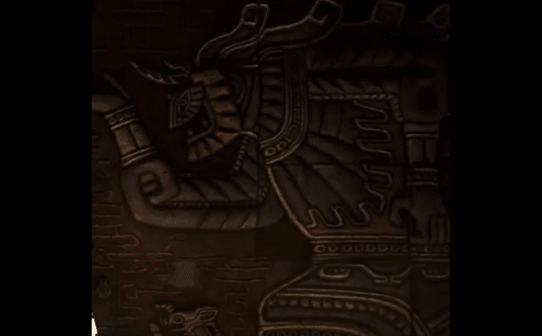
The flip side of this would be to make Ganondorf a poor little meow meow that was secretly controlled by the evil Demise all along, and... I’ll be real. I really don’t think it solves our problem at all. It might even make it worse.
My problem with how gerudos have been handled thus far, being mostly connected to how they behave in relation to hylians Good, is that they’ve been systematically defanged not to threaten the status quo as much as they used to. I think it’s pretty clear why I’m not a fan of Ganondorf being a mere victim of cosmic circumstances; I have a post that goes more in depth about this, but to simplify: my man has legitimate grievances. To make him a mere puppet to Evil Incarnate would, to me, be just another attempt to erase the despotism of the Goddesses, the unjust hierarchy of the world, what hylians have historically done to the races they were in conflict with (looking at the Yiga for the most recent example…)
I’m not saying his fight is clean or even legitimate, that he isn't driven by his own sense of self-importance above anything else, or that he should win (he has no plan beyond domination and victory, that's not a future). But I think there’s something really important about having someone being willing to fully consume himself and everything around him for the simple fact that someone should resist the order of the world. Even if that makes him a heartless, cruel, and egomaniac demon-pig. Even if there’s no Hyrule left to rule. Even if his own people despise him, or are long gone and forgotten.
Is it a little heart-wrenching? Uhh yes to me yes most definitively. This is why Wind Waker Ganondorf hits so hard, and remains (I think) his favorite entry in the series so far. But… I still find this fate of eternal resistance more resonant and empowered, and far less grim, than if Hyrule’s lore absorbs his hatred and rage, gives it to another entity that would be Badder (= more opposed to hylians and the goddesses), and scrubs it off anything icky and uncomfortable, rendering it completely domesticated and non-threatening to hylian domination; rubbed of his skin color, of his complexity, of his own emotions, even made... kind of sexy now, in the same way his sisters have been made before him? I am very, very afraid of him being turned from furious and an unapologetic subject in his own legend to a "redeemed" (according to whom??) and palatable object in somebody else’s, that you now end up having to… save from himself.
Again, I want to trust that Tears of the Kingdom can walk that line and preserve everything sharp and contrasting and profound and thrilling about this fascinating setup. I don’t expect a philosophy course, this is a game for children –but it doesn’t mean Nintendo didn’t do an astounding job with similar setups in the past. Again, I’ll invoke the Wind Waker conflict, but Twilight Princess did a lot of great things as well (Zant’s speech, if you can get past the weird stretches and stumping and NNHYAAAs, is pretty fantastic) –and the subtle writing of Majora’s Mask is also proof enough this series can be complex without being impermeable.
So this is where my hope lies. Not really with BotW’s writing, which, I’m sorry to say, but I found to be below what the series has done in the past (I have no problem with the setup and how the story is explored, I think it was a great idea, but wasn’t ever sold on the actual writing the way I may have been with previous titles –it felt… very tropey to me overall, with a couple of highlights). But Nintendo has shown to know how to write compelling stories for children that know where to sprinkle its darkness and how to preserve its hope, and this is this side I’m relying on for this delicate storyline moving forward.
And now? Now… I suppose we wait and see.
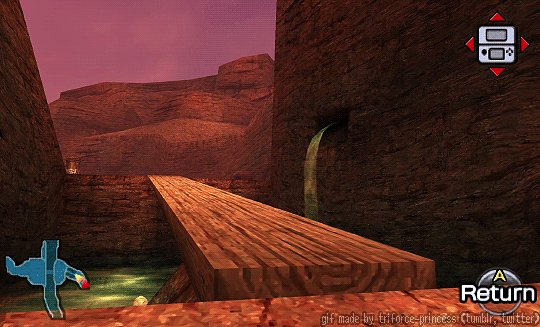
(thank you for reading my impossibly long essay what the actual hell, at least I got it all out of my system, see you in part 2 for when TotK comes out I suppose aaa)
#gerudos#gerudo#ganondorf#tloz#totk#botw#breath of the wild#ocarina of time#twilight princess#wind waker#ww#tp#meta#hylian critical#zelda meta#thoughts#this took SO LONG#but at least it's DONE#let me know if I say stupid things!!#I probably do!!
881 notes
·
View notes
Text
The obsession with wanting "consequences" to TOTK's ending are infuriating and shallow. (Massive TOTK Spoilers ahead)
"Why did they have to change Zelda back?"
Because her kingdom NEEDS her. Everyone, not just Link, is fighting together to get her back. NPCs tell you about things she did in between BOTW and TOTK to help them, stressing her importance as a leader. One of the schoolchildren waits outside her house every day in anticipation of her return. Speaking of which, Zelda was able to take her nerdy interests and love of learning and channel that love into bringing improvements to Hyrule via establishing a school and a research team. The kingdom is worse off without her. The title "Tears of the Kingdom" is important because the tears are Zelda's, and she IS the kingdom since she's all that's left of the royal family. It's kind of like the story of the Fisher King: the King is the land, and if the King is sick/ailing, so too is the land.
The main theme of the game is community. Director Hidemaro Fujibayashi had this to say about the game's core theme:
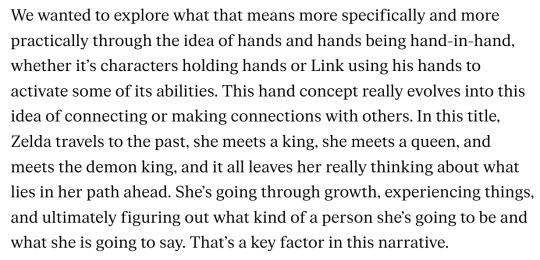
Everyone working together to push back the forces of evil and save their homeland. It's emphasized that Link (and many of the characters, especially the sages) can't do the job alone; he needs help. This even extends to the ending. Link's Recall wouldn't have been sufficient to change Zelda back; Rauru and Sonia amplify his power the same way Sonia and Zelda amplified Rauru's light beam in the Gerudo Invasion memory. Likewise, Rauru and Sonia couldn't bring Zelda back because Link had the necessary ingredient: a motive in the form of his love for Zelda. Just like how Zelda found the necessary motive to unlock her powers and save Link in BOTW, so too does Link accomplish the same in TOTK.
Leaving Zelda as a dragon would have contradicted her character development in BOTW, which amounted to her learning to move past her failure and loss from the Calamity. She also, um, can't figure out "what kind of person she's going to be and what she is going to say" if she's a dragon. The end of her arc amounts to her taking up the role of leadership and restoring her kingdom with the help of Link, the sages, et al. Again, the theme of community, connections, and working together to overcome obstacles.
"Why couldn't she come back with dragon features?"
Sonia explains that Recall recalls an object's memory, meaning the only result of the Literal Triforce of Link, Sonia, and Rauru using an amplified Recall on Zeldragon was to return her to the state she was before she ate the stone. This is why her stone is tied around her neck at the end. She couldn't have leftover dragon parts because she was never a dragon to begin with. Also, the greatest loss one could suffer from becoming a dragon is, as emphasized by Mineru, the loss of self, not the body.
"Why does Link get his old arm back?"
The amplified Recall restored it. Also, thematically, it works better for Link to grab hold of Zelda's hand with the hand with which he initially failed to grab her at the start of the game.
"Changing Zelda back nullifies her sacrifice."
No, it doesn't. She fully accepted she would never change back. She wasn't thinking about the possibility of Link saving her because as far as she knew that was impossible; she made her decision out of love for her kingdom and Link. In the end, she succeeded in her mission (as did Link). If she made the sacrifice with the assumption Link would save her, then I could see this argument holding water. But Link was never going to give up on her because he LOVES her. Even she's in disbelief at having changed back (and very thankful because now she's home). In the secret ending, she says, "I never thought I would stand in this place again." We feel the weight of her sacrifice in the final memory, and the ending provides an emotional release because we the player repay her for all she did to help us and because she more than proved her heroism. I liken it to the ending of Pinocchio (1940) wherein the Blue Fairy changes Pinocchio into a real boy as a reward for giving his life to save Geppetto's.
"Her not remembering being a dragon is a copout."
Mineru explains very clearly that becoming a dragon means losing one's self. You lose all your memories and indentity; you cease to be the person you were. So, yes, she wouldn't remember being a dragon flying around for centuries. But you know what she would remember because it happened before she lost all sense of self?
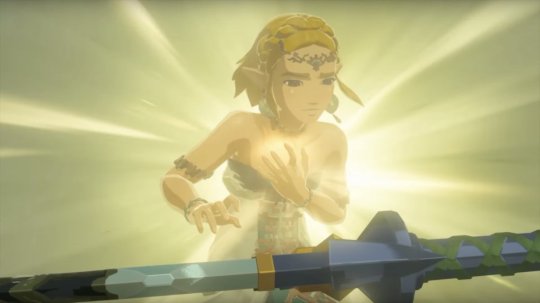
Though not outright stated, it's clear from the character animation that Zelda was in immense pain as the transformation began to take effect. Also, you can tell she was absolutely terrified in that moment. She knew what she was doing was necessary to save her kingdom, but she's thinking, "Shit, these are my last few seconds before I lose myself forever. I'll never see my loved ones again: Link, Purah, Robbie, Riju, Sidon, the schoolchildren in Hateno, etc. And I'm doing this all on a MASSIVE gamble and act of faith that Link will find me, reclaim the Master Sword, and destroy the Demon King." That's not the kind of traumatic event you'd easily forget. She'll probably be contemplating "Wow, if Link hadn't been so determined, I wouldn't be here now and that would have been my last moment alive," for some time. And no, you don't need to see her suffering psychological effects in-game; that's best left up to the viewer's imagination; there's only so much story they can cram into the game before it's overstuffed.
"Why did Rauru and Sonia come back to restore Zelda?"
Because they loved her, and Zelda loved them. From the moment Zelda met them, they promised to find a way to return her home to reunite with Link. They have an emotional (and familial) connection to her. By helping Link restore her, they're extending a final act of love to the princess they adore so much. It's a beautiful sendoff to them, because unlike Zelda's biological parents (Zelda's mother died when she was six, and Rhoam was too busy being a king to actually be a father to her), they were able to provide for and help her on her journey. It would have been a mistake to not bring them back to wrap up that plot point.
I think a lot of nerds suffer from Cinema Sins/TV Tropes brain: only able to deal in the most literal without any room for meaning. "Punishing" Zelda for her sacrifice wouldn't have added anything to her arc, as the whole point of her character isn't to be a stoic symbol for her people to mindlessly obey. The game deals in second chances, not just for Zelda obviously but also for Link. Link gets a second chance at the end to catch Zelda to make up for not catching her at the beginning; that's parallel storytelling with actual deliberate meaning behind it. Otherwise, the story amounts to, "He fucked up and there's nothing he can do about it." Remember that much like Zelda, Link had enormous pressure placed on him from a young age. He was expected to carry his duties out lest the entire kingdom be DOOMED FOREVER. But with TOTK's ending, he can realize that he doesn't have to worry about that pressure since no one's forcing it on him anymore. He can shape his own destiny and bounce back from a mistake; he doesn't have to lose Zelda forever.
I've already explained that the power Link, Sonia, and Rauru use is just an amplified Recall, but technical explanations aside, it's mainly the sort of scene that's driven more by emotions than by "logic." A good example of a scene that relies on the emotions of the story to carry it is the climax of Disney's Dumbo (1941). Animation critic/historian Michael Barrier writes:
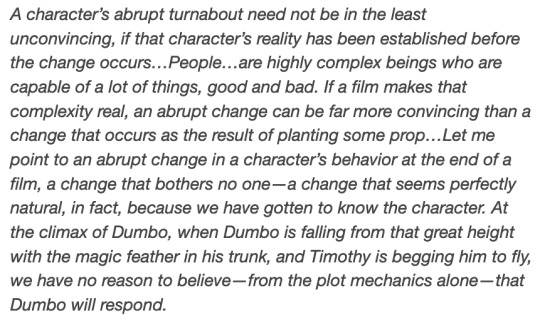
If you're the sort of person who questions why Dumbo is able to fly without the "magic feather" or how Dorothy Gale goes home just by clicking her heels and repeating the mantra "There's no place like home," you probably shouldn't be watching movies.
Special thanks to @avalypuff, @blueskittlesart, @thecagedsong, @aquaticpal, and @nolongerapileofashprobably for their posts on the subject; all of you made some excellent insights on the ending and how it ties in with the game's themes. I'll go ahead and link to said posts for further reference:
#princess zelda#totk spoilers#zelda totk#tears of the kingdom#the legend of zelda#nerds please stop learning media literacy from cinema sins and tv tropes#this post took a lot out of me#but i had to get it off my chest#a darker sadder ending would not have worked thematically
263 notes
·
View notes
Note
you might've talked about this already but. god. there's just Something about the gloom hands always reaching and trying to grab you - a direct reflection of link trying to grab zelda and failing. there's just Something about one of the most terrifying enemies in the entire game, especially when you first encounter them, being hands that will try to grab you no matter where you run and what you climb. And even the way they disappear after they fail but haven't died; like zelda disappeared. fuck.
I actually havent done much analysis of the gloom hands but i gladly will now that youve given me a reason to because you're right about the reaching motion being reminiscent of link's failure at the beginning of the game. Similarly, the other most notable thing about the gloom hands imo is the fact that they turn the sky red when they're approaching. most people compare this to a midday blood moon, but what it really reminds ME of is the way the sky above hyrule castle changes the closer you get to the sanctum in botw. the red sky is something that, in botw, was visual shorthand for calamity ganon, so imo the hands are representative of not just his failure at the beginning of totk, but his initial failure to stop the calamity in botw as well. They are essentially link's regrets CHASING HIM DOWN.
another thing that I find really interesting about the gloom hands is that they're actually not that hard to beat, relatively speaking. as long as you have some bombs or elemental arrows and a decent weapon to hit phantom ganon with they generally go down pretty easy. the reason they have this status among players as the worst enemy in the game is purely because of how TERRIFYING they are. if you can shoot them with a bomb arrow you're fine, but because of the genuine fear they inspire in players most people's initial reaction to them is to either run away or freeze in place. unlike botw's guardians which were genuinely almost impossible to defeat early-game, the gloom hands are actually easily defeatable. they're just so SCARY that running seems like the better option. and I think that says something about what role they play and what they represent to link within the context of the game--failure, and specifically his personal failures, is something so terrifying to him that he can't help but run from it even though he KNOWS he's capable enough to face it. because of his years serving as zelda's knight and the trauma that came along with his role pre-calamity, his own mistakes have become something too terrifying to even think about facing.
and the fact that the hands reveal phantom ganon once they fall is important too! because the REAL trauma link is facing didn't actually come from his mistakes. it came from ganon. The true evil behind every problem he's faced concealed itself so well that link begins to think that HE is at fault for the suffering he faces--because he couldn't stop the calamity, because he couldn't reach zelda, THAT'S why bad things are happening. but it was never ACTUALLY his fault, and when he is willing to confront his own fears head-on they easily fall through and the true root of the problem reveals itself.
#maybe this is the totk comic. ive been trying to find something good enough to write a totk comic about#the gloom hands. that might be it. much to think about#zelda analysis#totk spoilers
282 notes
·
View notes
Text
Okay, so I've seen a lot of complaints about the writing in totk, but I think the critiques are taking too narrow a view. Sure the arcs seem flat if you start from the point of Zelda and Link traveling below hyrule castle, but I don't think that's where you, the viewer, are supposed to start. You're supposed to start the story from the true ending of botw, and in doing so, the character arcs become not only beautiful, but complimentary and fulfilling. Spoilers under the cut.
Why should you start at the end of botw instead of the start of the game? Easy, because the game has to start in medias res, it's the nature of the game, but the story the game tells starts where botw leaves off.
They did this in botw. The game starts in the shrine of resurrection, but the story starts with Zelda's first journal entry/memory and the story is really about discovering your own fall and the rebirth that comes after destruction once hope exists in the light. The character arcs are about Zelda going from stubborn isolated powerless princess to conquering evil with the power of love. Link goes from the stoic knight that puts up with every expectation and falls to Link the amnesiac going at his own pace, at his own freedom, and succeeding.
The same way botw's story starts 100 years earlier, you have to start Zelda and Link's totk arcs from the true ending of botw. From the girl that had come to terms with her own powerlessness and sought to begin rebuilding from ash and the boy who fulfilled his one task, and is still choosing to use his freedom to help the dethroned princess rebuild.
The way Zelda is written is beautiful if you start from there. Because botw ended with her accepting that she had worth and duty beyond the golden power, and totk tells you how she showed that worth through service to her people. That girl that dreamed of being a scholar became a school teacher. That girl that had to fight so hard for her father's love and was convinced that everyone hated her own powerlessness? In her powerlessness she shared her knowledge with people and became loved for it. That girl who we left seeking the Zora, the only people that would remember her, when almost no one knows about the princess who was locked in the castle, is now known throughout the land. The girl that was missing for 100 years with only the sheikah remembering her, she disappears and the whole kingdom fights to find her.
The girl we saw walking away from the ruins of her home and her cage, listening to the distant goodbyes of her long-deceased loved ones, now has a home in Hateno where children run up to her house with just as much love screaming her name.
Now, in the middle of her arc, the start of totk, Zelda goes to confront the ghosts of Hyrule castle. In all her adventures in the time skip, Castletown and the castle are nowhere on the list. They are as destroyed as they were at the end of botw. BUT she has healed and grown, and is now strong enough, and ready enough to fulfill her duty, that she can return.
But she doesn't come back as it's princess, seeking to rebuild, she comes back as the archeologist, seeking to plunder its secrets. She hides the Champion's tunic there, (with a riddle involving light) and gasps in delight over all the archeological discoveries that had laid hidden beneath her feet all these years. She can handle the empty castle as a scholar.
But then she's in the past, and she's without Link, and she's meeting the people that established the kingdom she let fall to ruin. Zelda learns about the importance of being unified, as seen from her requests to the ancient sages, a central theme of totk. Zelda faces her own powerlessness when Mineru tells her there is no way back, and when Sonia begins to teach her control. Zelda immediately despairs over ever having the control and power Sonia wields, and it's the same frustration she had with her golden power when she was younger. But she asks for and accepts help this time (like she should have from Mipha in botw) and she gains control and power and it isn't enough in the past, but she knows how to make it enough.
Having united the sages, they watch her sacrifice in a sign of respect. The sheer ceremony of the moment is like nothing we've heard about what Zelda was like during the time skip. It isn't Miss Zelda the teacher that built a school in hateno, or Zelda the scholar that walked through Hyrule castle, it is once again Zelda the Princess making this sacrifice to swallow the stone.
It's meant to parallel the moment in botw where Zelda gets swallowed up by the Calamity. But you can see that she is surer of herself, centered, unafraid, and she does not ask Link to save her. She is not praying and looking back and asking Link to come save her. Instead, she tells him to save Hyrule. And it has meaning because she is also Zelda the scholar and Zelda the teacher and the thousand of other things we learn about her activities during the time skip. That is the hyrule she wants to save. That is the Hyrule she seeks to unite by asking the sages to bind their people to help Link in the future.
(She pressed the sword to her chest in a way that mirrored her stabbing herself, this time it is Zelda who died so that Link might live in the future.)
When Zelda tells Link that she's come home, you cannot say she has not changed from the homeless girl who had just learned to accept that her worth did not lie in birthrights and golden power. Zelda had learned her worth in the skills completely absent of any power, political or golden, but in the second half of her arc took up power and leadership again because that was what Hyrule needed of her. Because of the examples of Sonia and Rauru and because her fallen kingdom wasn't united and it needed to be. She is so much more complete than at the ending of botw, or even the start of totk. She has retaken the mantle of Princess, but she knows what it is about now and I don't know how else to say it if you aren't getting it.
Then comes Link, whose flexibility as the player has always required a less complex character arc, and probably deserves its own post, but I want to give it a quickshot anyway. Link leaves off botw probably still missing most of his memories, with the mastersword on his back, this time choosing to protect and walk with Zelda on her journey around Hyrule.
In the time skip, we learn that he sticks to her like glue. Princess Zelda and Link are perpetually paired by the people of Hyrule. Link barely even registers in people's memories without Zelda around, because he hasn't truly left her in all 5-7 years during the timeskip. He is known (again?) as 'Princess Zelda's loyal swordsman'. Is that a sign of him reclaiming some of his past life? Could be. What's important to learn about Link in the time skip is that he is no longer alone. Which is a big step from botw ending Link, who was always alone and had just begun traveling with Zelda again. From the rootlessness of botw, to saving Zelda, to making Zelda the place he always chooses to be, that's how Link's grown in the timeskip. He is no longer alone because he has Zelda.
He has someone worth fighting for now, he has memories of someone precious, someone he scours Hyrule to find. Link's freedom in botw was about discovering himself, but in totk, he is using his freedom to do everything to go to her. HE HAS A HOME NOW AND ITS CALLED ZELDA. Investigating rumors, walking into obvious traps, asking everyone and their dog about her. The goal of the game is to find Zelda. Bring her back.
And then you learn about Zelda's transformation. You see her crying. He pulls each of her tears and memories into himself. And this time it's Link asking 'do you really remember me?'. He has to take up Zelda's role and bring the amnesiac back to herself, give her back her memories. The job's not done because he found her transformed, she needs her memory back, it's not done until she's back and knows herself.
This arc is coupled with Link confronting his own failures. He was at the height of his powers when the demon king Zapped him and he let Zelda slip through his fingers. He failed her, just like he did before. And the people that do recognize him without Zelda all ask him where she is, and he has to admit he failed to them too, something he didn't have to do in botw.
But unlike botw, where he failed and the solution was to get strong enough not to fail/be strong at the same time Zelda is, in totk, the solution is to unite with allies. Unite the tribes, accept their help, and only then is Link and crew strong enough to take on the demon king.
It is only when he also takes up the mantle of Rauru and Sonia and unites Hyrule into a single force, it is only when he accepts aid from the past and pulls their vision of hyrule into the future, that he gets Zelda back. Zelda needed to learn how to take up being a princess again for the sake of Hyrule. Link needed to learn how to unite Hyrule for the sake of Zelda.
And though I would have liked Zelda to be a little dragonish, or Link to deal with being an amputee, it doesn't bother me that much because their arcs weren't about that. I don't think it makes the stories bad writing.
But you have to start from the true ending of botw to get that.
#totk meta#Link#Zelda#zelink#totk#totk spoilers#writing analysis#positive writing analysis#I spent way too much time on this but it's been a while since I've done this so its okay
386 notes
·
View notes
Text
not sure if i have talked about this before but i also really hate how gorons are treated in totk
they are one of my fav and i know they are unpopular and were always kinda slot into the "big fat stupid rock people" role, but i do think totk is one of or the worst case yet; all regions get some life threatening event (ignoring how stupid it is to put the issues you need to solve in the exact same spots as in botw with most changes being also reversible so the actual changes to the environment of the map are largely some small rocks sprinkled about) and they get .. drugs (haha)
like i dont wanna downplay anything but their problem being that they are obsessed with eating (>_>) some drugged rock that makes them mean and lazy (even if the reason is fine ... if i remember right and didnt make up that they had to dig elsewhere for food bc of death mountain losing its lava flow, the execution is my problem -like the vast majority of this game is a ok to great idea with passable to horrible execution of it) and arent even a danger to you (which i thought at first when you approach goronia the normal path and two gorons start to walk towards you if you come near saying creepy shit- i thought they are gonna attack me or lure me into a trap but again .. only to find them wanting me to pay to be let through (i think??) and all other drugged ones are largely just ... eating or lying around ........
like it would have been cool if that drugged rock stuff made them actually agressive, like the friendly easy going rock people being turned into something akin to a starved animal after eating poison bc they were at risk of starving sounds alot more .. impactful and scary (even if it would still be about food, which idk about you but the only kind of fatter npcs, even if non human, being made all about food is .. hm, aside from other possibly bad implications from this, but im trying to roll with the idea of it)
and then poor yuno being put in a stupid (stereotypical?) wrestler outfit and hes LITERALLY being mindcontrolled is so ...... ugh (again, idea is ok but- you get it) and then him being told by two CHILDREN that that obviously not zelda might not be zelda and it not only being the only time that idea is openly said until its "revealed" that hhhwhat?? it was a fake one?? in the mid battle of the "story" and he doesnt even believe it (both bc haha hes stupid and cant understand such a thing and also link not being able to tell anyone ... even his friends ....... ) is just so disrespectful, its ok not to be the smartest guy in the room (tho in totk pretty much anyone is made so much dumber for no reason...) but it being so clearly the gorons that get treated like this just annoys me so much, you know no one of the other races would be treated like that
(not to reach a little but it also plays into how koga is portrayed, like i love him to death and there are things that largely the gameplay only implies of him not being that incompetent, but hes clearly meant to be laughing material, the boss of the band of 'evil' assassins being lazy, incompetent and 'childish' is funny right?? and although i hc that the either super thin or super beefed up appearance of yiga members are just an appearance like their disguises of normal people to seem more unified and less indentifyable- that is still only a hc and then koga being the only character that is visibly fatter (aside from ... the gorons and .. king dorephan??) it puts a pebble more onto the pile of pebbles of little annoyances)
also yuno saying, post mid "story" battle, that no one actually knows anything about ganondorf aside from him being evil and it going complete ingored and never mentioned again feels like the type of thing a games does when they are critized for soemthing and instead of changing it they put a line in the game essentially saying "yeah we know but we are not gonna do aynthing about it lol"
(like thinking of the line ashe from league of legends, whos design has been critized alot bc shes running around in a stupid tiny dress in the snow lands of their world, got when her dialog was updated that made her say sth like "yes im wearing a little dress in the forever winter land, deal with it lol" which perhaps was supposed to be a joke but it just feels like a "lol we know, fuck you")
#ganondoodles talks#zelda#totk#ganondoodles rants#also may i say that i dont like that they made yuno be the boss of a company now??#idk i already didnt like how weirldy overtaking dumsda (hudson) thing got#and him suddendly beign the boss instead of landa (...the dance guy that you buy the house from in botw idk his engl name)#whos now chilling in angelstedt (lurelin?) like hes a shunned king in exile#idk feels off#and no im not saying everything about everything is bad#again I LOVE KOGA AND YUNO#and i dont mean they both have to be the coolest smartest guy around#i find the trend of only their types of design to be the ones made to look stupid and lazy troublesome#THAT is my problem#and yes theres lots to read into koga especially but still#at least it felt like to me that the game realyl wanted you to think of koga being a modern tingle
120 notes
·
View notes
Text
Insane to me that in BOTW you are asked to question the validity of tradition and the powers that govern through it. Whether relying solely on beliefs of ancestors from thousands of years ago should still be upheld despite overwhelming proof that it's not working. Through Princess Zelda you see just how constricting and cruel tradition can be when one doesn't fit the mold of its requirements and how it can utterly destroy someone's sense of value to themselves and to the world around them. It asks "How many like her have come before? How many Zeldas who, by the misfortune of being born in a peaceful era, never got the same opportunity for freedom in the same way that this Zelda does? Ironic that the Calamity became the very thing that freed Zelda from the confines of Tradition."
And then ToTK turns around, looks you in the eyes and says "Actually tradition is very Important and Good and The Only Thing that stands in the way of Pure Evil. Go on this quest centered around praising ancestors past and mimic their tragically lost influence to Bring Peace and Happiness to everyone!! Also Zelda's character growth involves becoming the picture perfect Ideal of the very thing that made the majority of her life utterly miserable because now she's Perfect and isnt that divine? Definitely don't think about the tragic implications that has lore wise since it tells you that no matter how unique you may be, you will eventually become exactly like the rest from ages past. Anyways go kill a Lynel!!"
#zelda criticism#zelda totk#tears of the kingdom#breath of the wild#botw#zelda botw#princess zelda#totk spoilers#totk critical#totk criticism#botw critical#botw criticism#the legend of zelda#zelda meta#totk meta#loz totk#loz botw#loz
68 notes
·
View notes
Text
Okay but the sheer amount of unique worldbuilding and lore in Cadence of Hyrule.

Link as a fully realized, fully recognized hero, despite never getting the Master Sword. He knows what he's doing without destiny yanking him around by the collar.
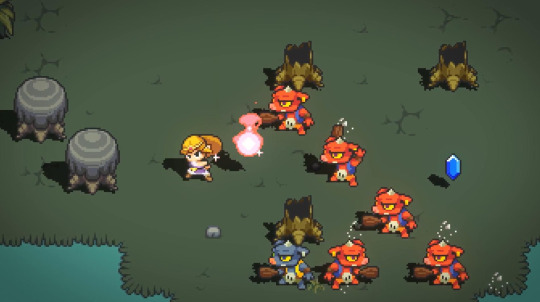
Zelda able to operate singlehandedly, with as much dungeon-crawling ability as Link's often given.

Shadow Link also having a Shadow Zel counterpart, implying that it's a sort of magic mimic rather than a specter haunting the Hero specifically. Not just that, but a mimic with AGENCY that can choose to help you.
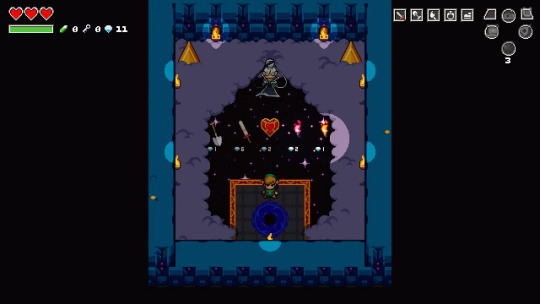
A canonical reason for Link being able to respawn after death, without breaking immersion.

The oracles? Possibly? Their colors suggest so, but who are these ladies? Where do they come from? How do they know the future?
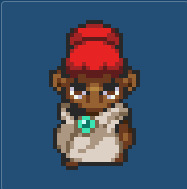
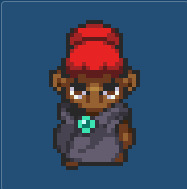

Gerudo with designs that make sense for the desert!

And a knack for technology! Which is really sick!

Prince Ganondorf! Meaning that not only was he raised in Gerudo Town with his fellow Gerudo, but Link got his hero status WITHOUT taking him down!

Branching timelines? That are referenced in-game? And can be averted depending on which side of the game you want to play?
In fact, it's complete mix of the three canon timelines' placement. River Zora (called "evil Zora") exist. The overworld theme takes from Wind Waker's great sea. Deku scrubs and the Great Deku Tree are around. Sea Zora (aka the "friendly Zora" of OoT onward) are sharks. Zelda, Link, and Ganon have Downfall timeline designs. Octavo references Vaati in his design. There are BotW Bokoblins and Keese, Wind Waker kargaroks, Iron Knuckles and Darknuts both, Taluses and Lynels and Hinoxes... Where is it in the timeline? Who knows? Wherever your heart thinks it belongs.

Then there's how the Triforce calls to Cadence, like it did to Link in the Oracles games. How they have the power to isekai whomever they want, Link just happens to be the nearest fit 99% of the time. How Cadence has as much a claim to Power as Ganondorf is usually given.
And the ITEMS. The SWORDS. Where did Caladbolg come from? Where did Fragarach? Why does the Jeweled Dagger look Sheikah-made? Why can I put Link in glass slippers?
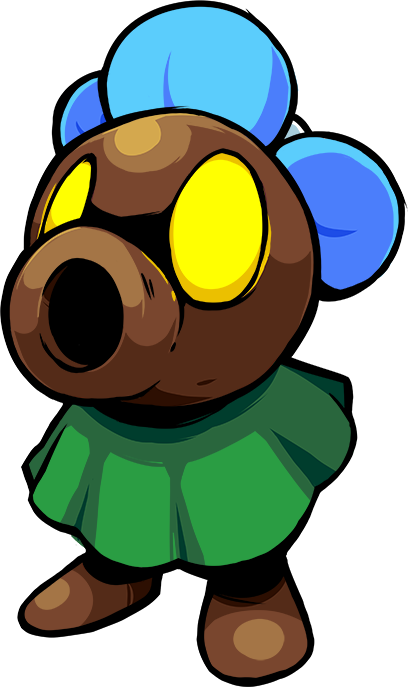
Also Yves my beloved. My little hero sprout. I love you.
763 notes
·
View notes
Text
246 Days since Tears of the Kingdom Released. Watched PointCrows 5hour play through of TOTK instead of being productive (yesterday was a tough day) and I was struck by a few things I had forgotten. While I wish Nintendo had expanded on the lore a bit more/given us more side stories for the champions, I really really adored the themes of the game. I love that BOTW was all about wandering a ruined kingdom mostly alone but in TOTK everything takes the chance to say no you don’t have to do this alone. Link has support, Link has companions, Link gets to work with the people of Hyrule. Same for Zelda. She also isn’t as alone as BOTW. She has Sonia and Rauru to teach her and be the parents she never got. Then there’s also the presence of Zelda throughout the game. It’s called Legend of Zelda and I really felt that title to be true in Totk because no matter where you went her presence was felt. Her memories, her people loving and remembering what she did for them, her evil twin, and of course her as a dragon. Plus she made the sages promise to support Link. Zelda really set up everything so that Link would be able to defeat Ganondorf. She trusted us to do so and so did Rauru which by the way the line “remember this name” when he’s telling Ganondorf about Link was so freaking cool. I never spent long playing the game without thinking about Zelda and seeing her impact across Hyrule. So yeah just a few thoughts.
86 notes
·
View notes